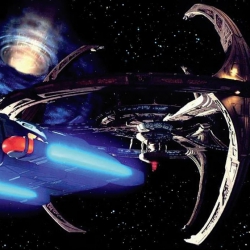
The USS Defiant was added in later years to give the Federation heroes a better chance for space adventures, but it will be a big part of the gambling machine’s fun.
Game Co. and CBS Consumer Products have entered into a license agreement to produce a video game-based gambling machine based on the Star Trek franchise. The first gambling machine features Star Trek: Deep Space Nine Adventure, but subsequent games are going to be based on the Original Series, the Next Generation, Voyager, and Enterprise.
The Star Trek slot machines are designed for the three Caesars Entertainment casinos in New Jersey: Caesars Atlantic City, Harrah’s Atlantic City, and Bally’s Casino.
Game Co. plans to release up to 10 other games based on pop culture franchises: Paramount’s “Mission Impossible,” “Ferris Bueller,” “Terminator 2: Judgment Day”, and “Paranormal”. All of the titles are designed as skill-based video games.
Deep Space Nine Gambling Machine
The Deep Space Nine game is based the third Star Trek TV series, which first aired over a 7-season run from January 1993 to June 1999. Players will be able to fly a 3D simulation of the U.S.S. Defiant and engage in virtual combat with other ships from the series, including the Cardassians, The Jem’Hadar, and The Founders.
Subsequent games will feature iconic versions of the USS Enterprise, along with ships used by the Klingons and Romulans. Launching the ST: Deep Space Nine Slot Machine first allows the designers to perfect the technology for the Original Series and the Next Generation, which were the most popular series in the franchise.
GameCo plans to release the first title in the fall of 2017 under the licensed name “Star Trek Deep Space Nine Adventure”. The game is the next in a wave of skill-based games designed to attract millennial game enthusiasts to casinos.
Skill-Based Slots
Since the Nevada State Legislature first approved skill-based slots in 2015, people have speculated what the new skill games are going to look like. The early assumption was they would be like traditional slot machines, but have a bonus game with skill elements.
Depending on a player’s skill, the house edge might range between 88% and 98%. The bonus games would be based on popular arcade, home console, and social media games. Titles like Angry Birds, Pac-Man, Space Invaders, and Candy Crush were named as possible inclusions.
Game Co Skill Games
Game Co. which was co-founded for the skill game market by CEO Blaine Graboyes, was the first to launch a game in the Atlantic City market. GameCo’s first release, “Danger Area”, appeared in Caesars’ Atlantic City casinos in the fall of 2016 to mixed reviews.
Danger Area was somewhat clunky and many players complained it only gave the appearance of a skill-based resolution. Still, it was a prototype game with game designers feeling their way in an entirely new industry — dealing with regulators who might have had radically different ideas of what a fair game might be.
Players have high hopes for the second generation of games, because they represent an improved technology and they carry a movie or TV license. Deep Space Nine Adventure is the next opportunity to see what GameCo’s game designers have learned. With 3D space battles involved, a successful design could make Deep Space Nine Adventure a favorite on Atlantic City casino floors.
Deep Space Nine TV Series Profile
Deep Space Nine was the first Star Trek television series which broke from the tradition of space exploration and remains the only series to avoid that premise to this day. Instead, the setting was a space station far removed from Federation space. It was a kind of “Casablanca in space”, as rogues and agents from a variety of alien cultures and governments coexisted. The Deep Space Nine space station existed on the other end of a wormhole from the Federation, so Commander Sisko and his Federation staff always were in a more precarious situation than your average Federation officer.
While many Star Trek fans were critical of the move away from the utopian space exploration theme of the earlier series, Deep Space Nine received better reviews in its later seasons. By then, it moved away from episodic stories into a metaplot based around intersteller intrigue and power politics. Shapeshifters, drug-enhanced slave warriors, and assassins masquerading as barbers were just some of the elements which made the series a favorite with many Trekkies.
In the end, Commander Sisko was seen as a believable and likeable Star Trek leader who was neither like the Captain Kirk the space cowboy nor Captain Piccard the diplomat. Characters like Sisko and Dax were fan favorites, while Worf of Next Generation fame became a regular member of the cast and eventually got to show off his martial skills in a way which never happened on The Next Generation.
